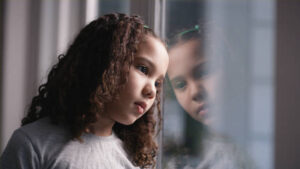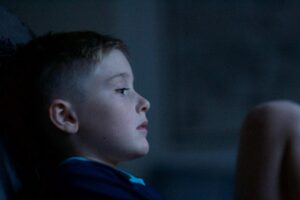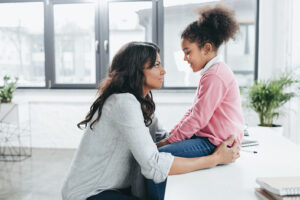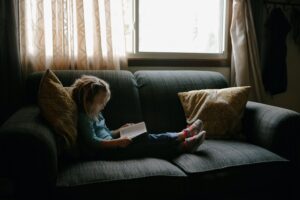Childline are preparing for a rise in children contacting them about loneliness this summer, while the NSPCC Helpline is also expecting an increase in adults reporting concerns about children being left home alone.
 Childline is reminding people that their free, confidential helpline and their Building Connections service are both available to provide support and a safe space throughout the summer for any children who may be struggling.
Childline is reminding people that their free, confidential helpline and their Building Connections service are both available to provide support and a safe space throughout the summer for any children who may be struggling.
Last year, Childline delivered over 4,500 counselling sessions for children and young people experiencing feelings of loneliness, equating to an average of 380 sessions per month.
Childline sees summer spike in children experiencing loneliness
 But the national charity helpline experienced a spike in these types of calls during the school summer break, delivering a total of 852 counselling sessions about loneliness during July and August 2025.
But the national charity helpline experienced a spike in these types of calls during the school summer break, delivering a total of 852 counselling sessions about loneliness during July and August 2025.
Children contacting Childline for summer counselling sessions were mainly worried about:
- A lack of contact with friends over the summer
- Feeling excluded from summer social activities
- Moving to a new school or year group in September
The Director of Childline, Shaun Friel, said the summer holidays can be “a difficult period” for some children and young people as they break from their usual routines.
He explained:
“Loneliness is a challenging thing to contend with and, left unaddressed, can start to have a wider impact on mental health and wellbeing. It is very important that children or young people who find themselves in this situation during the school holidays, or any other time of year, understand that support is out there for them.
“As well as speaking with one of our trained Childline counsellors, they can also access our Building Connections service, which helps children to find a path to feeling less lonely. Whatever their worry, Childline continues to be here for young people.”
Helping children deal with loneliness
The Building Connections service is a free online text befriending service which has been launched to support children and young people dealing with loneliness. Young people aged 9 to 19 are matched with a trained befriender for 11 sessions who will help to build their confidence and to manage feelings of loneliness and isolation.
Childline offers key steps for adults who are supporting a child experiencing loneliness. These include:
- Communicate openly
- Understand the cause
- Encourage socialising
- Build confidence
- Create a supportive environment
For young people experiencing loneliness and isolation and who may be struggling with their mental health, they offer the following advice:
- Do things that feel positive
- Take care of yourself
- Try to find ways to socialise
- Remember it is always okay to ask for help
Concerns about children being left home alone this summer
 While Childline gears up to support more children and young people this summer, the NSPCC Helpline is expecting an increase in contacts from adults who are concerned about children being left home alone during the holidays.
While Childline gears up to support more children and young people this summer, the NSPCC Helpline is expecting an increase in contacts from adults who are concerned about children being left home alone during the holidays.
Between April 2024 and March 2025, the NSPCC Helpline received over 6,700 calls from adults who were concerned about a child being left home alone or unsupervised. This equates to an average of 560 calls each month.
However, calls on this subject peaked significantly during July and August last year, with a total of 1,276 contacts being made about children being left home alone across these two months alone.
The NSPCC acknowledges that the summer holidays can be “challenging” for parents trying to balance the competing demands of work and childcare. They are encouraging parents and carers to reach out to the helpline or the NSPCC website for advice if they are considering leaving children home alone.
As well as parents seeking advice, the charity often also hears from neighbours, friends, family and the public who notice problems when children are home alone.
Guidance for parents about leaving children home alone
 While there is no legal age limit for leaving children home alone, the NSPCC advises that adults should avoid leaving children under the age of 12 home alone. Parents must also judge if children aged 12 or older are capable and comfortable with being left unsupervised. They say that if the child is concerned about being left alone, their worries “should be respected.”
While there is no legal age limit for leaving children home alone, the NSPCC advises that adults should avoid leaving children under the age of 12 home alone. Parents must also judge if children aged 12 or older are capable and comfortable with being left unsupervised. They say that if the child is concerned about being left alone, their worries “should be respected.”
They also provide the following advice for parents and carers of young people who are ready to remain at home unsupervised:
- Discuss scenarios that may take place and how to deal with them, such as how they should respond if someone came to the door
- Make sure they have the emergency services and relevant contact numbers written down
- Agree what they will do with their time while you are not at home and what they are not allowed to do
- Be clear about what time you will return, let the child know if your plans change, and check in regularly
- Try leaving them for just a short amount of time at first, such as no more than 20 minutes, and build the duration up over time
The NSPCC provides further advice and a quiz to help parents and carers assess if a child is ready to be left home alone on their website.
The Head of the NSPCC Helpline, Kam Thandi, says the charity recognises that the long summer holidays can present “a major headache” for parents trying to juggle work commitments while ensuring their children are safe and well looked after. She says this can lead some parents to question whether leaving children home alone unsupervised is a “viable option.”
She explains:
“Even if the child is aged 12 or over it’s still essential to check they’re comfortable with being left unsupervised and to also map out together what they’ll be doing while you’re away and what they should do if something goes wrong.
“For additional support and guidance, our Helpline and website has a wealth of information and expertise which parents and carers can also draw on.”
Adults who are concerned about the welfare of a child or young person can contact the NSPCC Helpline on 0808 800 5000, while children and young people looking for advice and support can call Childline on 0800 1111.
Training and support for early years, schools and childcare
 First Response Training (FRT) is a leading national training provider delivering courses in subjects such as health and safety, first aid, fire safety, manual handling, food safety, mental health, health and social care, safeguarding and more.
First Response Training (FRT) is a leading national training provider delivering courses in subjects such as health and safety, first aid, fire safety, manual handling, food safety, mental health, health and social care, safeguarding and more.
They work with a large number of early years and childcare providers, as well as schools, colleges, and children’s services.
Their mental health training courses include Understanding Mental Health, Youth Mental Health First Aid, Anxiety Awareness, Self-Harm Awareness and Suicide Awareness.
A trainer from FRT says:
“We know that many children faced isolation and loneliness during the pandemic, and this has continued for many, with lots of children and young people also experiencing social and general anxiety, as well as depression in many cases.
“It’s vitally important that we keep talking openly about mental health and that we take the time to make meaningful connections, and have conversations, with children to support their wellbeing and check in with them about how they’re feeling.
“It’s also really important for anyone who works closely with children and young people to have a good understanding of mental health and be able to spot the signs that someone may be struggling. They should also feel confident to offer appropriate early help and support. Focused training can help with this.”
A brief summary of our mental health training can now be downloaded as an infographic.
You can also download our free Guide to Mental Health Training from our website.
For more information on the training that FRT can provide, please call them today on freephone 0800 310 2300 or send an e-mail to info@firstresponsetraining.com.
